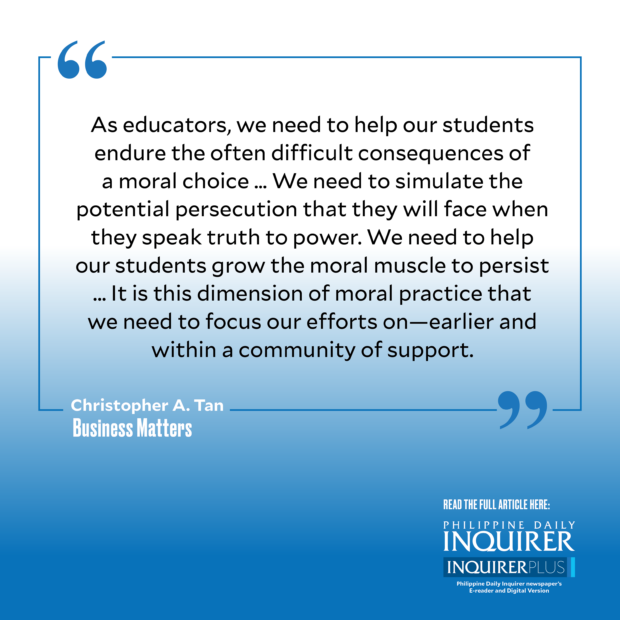Democracy, education, and hope

Last Nov. 7, Phinma Corp. hosted a roundtable discussion with Korvi Rakshand, the 2023 Ramon Magsaysay Award Foundation awardee for emergent leadership. The event, which is part of an ongoing series of policy discussions, tackled democratizing education across the developing world. We focused on how policies and learning strategies can be tailored for underserved youth—the very same students we serve in Phinma Education.
Rakshand is an authority on the subject as the founder of JAAGO (Bengali: “wake up”) Foundation. His organization provides free of cost, government-recognized English-language primary and secondary education to underserved children through 11 traditional and online schools in 10 districts in Bangladesh. It is one of the largest, most dynamic foundations in the country with 50,000 active volunteers every year.
Throughout the roundtable discussion, it became clear to me that there is a communal dimension to democratizing education. We are not just doing our work to improve the lives of individual students. Our goal is also to help create a just community, a community of compassion, a community of hope.
Article continues after this advertisementSince 2016, democracies around the world have been flirting with some form of autocracy. What makes this phenomenon particularly perplexing is that these demagogues were voted into office. They didn’t even try to grab power. Voters seem to want them.
Several books have come out examining this recent turn toward tyranny. One such book is Patricia Evangelista’s “Some People Need Killing,” a harrowing chronicle of the mass killings carried out during President Rodrigo Duterte’s regime. It grapples with the question of why Philippine society freely elected and continued to support a demagogue, who stoked fear among the public, and then blamed a minority for the dangers that he exaggerated.
Along with these questions on why free societies turned their backs on democracy are valid questions about the role of education in shaping our civic life. Although education plays an important role, we should be careful about falling into the trap of assuming that people are making irrational political choices simply because they are insufficiently educated. If we approach the problem this way, we will end up with ineffective solutions.
Article continues after this advertisementThe role of education is not just to tell right from wrong. As St. Paul wrote in his epistle to the Romans: “I want to do what is right, but I inevitably do what is wrong.” St. Paul reminds us that our moral failings are rarely failures of knowing. Rather, they are failures of practical preparation.
It is not enough to tell people what is right and what is wrong. As educators, we need to help our students endure the often difficult consequences of a moral choice. It is not enough, for example, to tell people that lying is wrong. We need to simulate the potential persecution that they will face when they speak truth to power. We need to help our students grow the moral muscle to persist. Like music lessons, if we want to be able to play music well, it is not enough to know what D flat major 7 is. We also need to practice our scales every single day. It is this dimension of moral practice that we need to focus our efforts on—earlier and within a community of support.
As educators, we also have the opportunity to give each of our students the precious gift of a good memory. The memory of being accepted for who they are. It is this memory of being valued as human beings that allows us to transcend feelings of alienation, and choose what is good. It is also important that these memories be shared. For our democracy to endure, we need, as a society, to have collective memories of working together for the common good.
In the end, our hope lies in our ability to be educated, both as learners and as teachers, and in our ability to use our freedoms for service and sacrifice.
—————-
Christopher A. Tan is Phinma Education’s country chief-Philippines. These remarks were delivered during “Democratizing Education Across the Developing World: A Roundtable Discussion” with Ramon Magsaysay awardee for emergent leadership Korvi Rakshand, hosted by Phinma Corp. on Nov. 7, 2023. Panelists included Philippine Institute for Development Studies senior researcher Dr. Jose Ramon Albert, Philippine Business for Education executive director Justine Raagas, and Phinma Education senior learning manager Cris Ngo.
—————-
Business Matters is a project of the Makati Business Club (makatibusinessclub@mbc.com.ph).
















